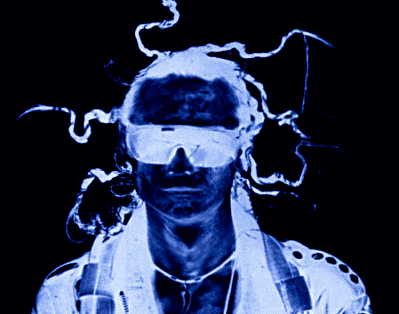
| Largeur 90% 70 | |

This definition is from the Future Culture Manifesto :
Cyberculture is a here-and-now reality that grew out of the science fiction movement of "cyberpunk". Look at the word "cyberpunk" -- broken down you have "cyber" and "punk" which roughly translates to people using technology and information in ways that deviate from the expected norms and mores and laws of society.
Hackers are part of cyberculture. I will draw more criticism by defining a hacker as a "cyberpunk" -- as previously stated, one who uses information and technology in ways that go against the grain of norm society.
Let me put to rest an ageold debate that persists among aspiring futureculturists, he said while slowly walking backwards to the bomb shelter. Hackers originated in the 60s, and basically did they same things hackers do now, unly possibly with less of a violent nature attached. Somewhere along the line, those hackers gave up their antiauthoritarian ideals and merged into mainstream society, though they still wanted to be called "hackers" because they can program a computer in nifty ways. Modern-day hackers came along, the WarGames generation, and the connection between illegality (antiauthoritarianism rather) and hackers resurfaced. Old hackers got pissed, and have done their best to dissociate themselves from the genreally-accepted term of modern day hacking. This is most clearly seen in their attempt to seperate "hackers" from "crackers" which I won't go into because old hackers don't realise that cracking is still hacking in the original true sense -- it does take skill and requires privied information.
Hackers nowadays, post-Wargames hackers at least, have as their motto "information wants to be free" and thus that is their goal in hacking or, more appropriately, being a cyberpunk.
Cyberculture, at its roots, appropriates (samples) heavily from other subcultures. This could be easily guessed because of the inclusion of the prefix "cyber", referring to information. In this context I would like to see usage of the term cyberculture return back to its roots -- the idea of an information culture. That is, a culture where information is an important commodity, if not the most vital commodity. Information is an important commodity in modern global culture, as witnessed by the power and popularity and prominence of CNN and Mtv in our society. When people talk about an information society, they are actually talking about cyberculture, and they are actually talking about a soon-to-be historical shift in society that is currently in it's infancy. Contributions to this shift will be seen in the wake of the ISDN (Integrated Services Digital Network) and other such technologies as they become more readily available and approachable to the mainstream.
We might say then, that cyberpunks (hackers, not just computer hackers either) provide the deviant portion of an existing cyberculture. Cyberculture should *NOT* be confused with technoculture, new edge, or futureculture, all of which will be put in the proper context later.
As I have said, cyberculture is in its infancy. We really *don't* live in an information society, because economics, not infomics or infonomics if you will, is the underlying thread that holds our society together. However, this may be beginning to change, as witness in our reliance on economic credit systems (your credit is just information, which can be hacked) as well as on a political scale the intertwining of political, media, and international-conglomerate businesses as the definite powerhouses. At the turn of the century, it was basically just political forces. Post-WW-II, as postindustrial society developed, it became politics + business which continues to this day, but now media (information power) is a substantial force in the global power game.
Rudy Rucker, prominent writer and scientist, is credited with the outstanding motto of cyberculture as a whole -- "How fast are you ? How dense ?" The phrase should be examined in the context of information processing, individuals dealing with a world that is transforming and morphing from economics-based to infonomics-based.